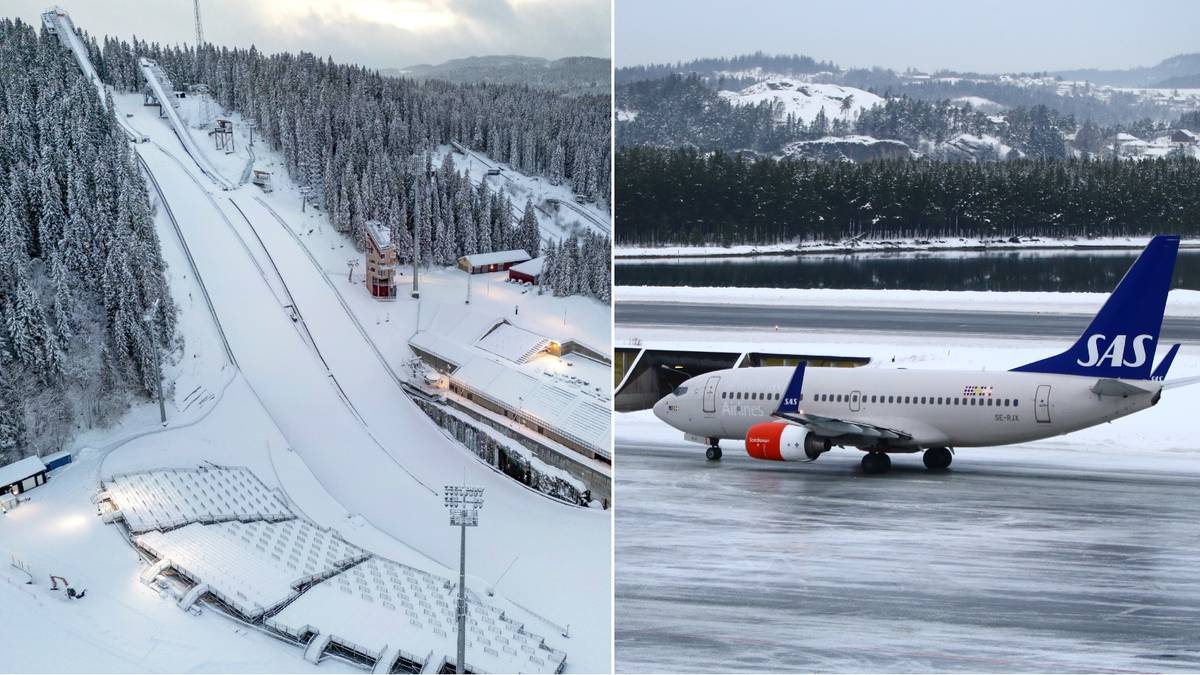
Trondheim Ski Worlds Claims to be the Most Sustainable Ever – Amid Rising Air Travel and Criticism
Originally published in NRK on February 01, 2025
It is a sad fact that ski sports are threatened by a warmer climate and lack of snow. The Ski World Championships in Trondheim have taken this to heart and claim that they will be the most sustainable ever – nothing less.
“More than just ski races, we also want to drive the sport and winter sports in a more sustainable direction,” says Ola Rønning to NRK.

CHIEF OF SUSTAINABILITY: Ola Rønning is proud of the championship’s climate measures.
Photo: Morten Waagø / Morten Waagø
In the mild winter weather, the head of sustainability at the Championships in Granåsen watches as VIP tents are being erected. He is proud of what the event is achieving in terms of hosting an environmentally friendly championship. He calls the coming installation in the tents the biggest victory.
Heating with Wood Briquettes
In Spongdal, just outside Trondheim, 300 cubic meters of wood chips are pressed into briquettes roughly the size of small snuff boxes. A fresh wood smell fills the storage room where these heaps will provide green heat for the VIP tents and lavvoes being set up at the VM arena in Granåsen.
• FLIS: Ketil Hagen from Pilot Anlegg shows the wood chip storage in Spongdal. • FLIS: The wood briquettes are made from chips supplied from Surnadal. • OVEN: An oven loaded with these briquettes will heat the tents in Granåsen.
“Compared to heating with diesel, using wood briquettes will save 750 tonnes of CO₂,” explains Rønning. "That’s equivalent to 441 round-trip flights from Oslo to New York for one person."
‘The List Must Almost Be There’
Not everyone is impressed with these environmental measures or the slogan of becoming the most sustainable Ski World Championships ever. Stig Schjølset, managing director of the environmental foundation Zero, acknowledges that cutting out diesel generators is a significant improvement. However, he points out that the biggest environmental impact comes from air travel.
Schjølset warns, "In the air, fossil energy still rules, and air travel – especially by participants and spectators – is the largest source of greenhouse gas emissions at major events."
Most Come by Plane
Approximately 6,000 accredited persons are expected in Trondheim. NRK’s overview from 10 major national federations shows that the vast majority of athletes and support staff are flying into Trondheim with a stopover in Oslo. None report flying to Oslo then taking the train, though Sweden states they consciously avoid flying.
According to Avinor, a 13 percent increase in passengers is expected at Værnes during the first week of the Championships compared to the same week last year.

Documentation in Question
Zero’s leader doubts that Trondheim 2025 can truly be claimed as the most sustainable Ski World Championships ever.
“If that is the ambition, they must document what Trondheim has done compared to other championships. And I do not believe they can do that,” remarks Schjølset. He adds that while it is commendable that Trondheim has ambitions to make the event as eco-friendly as possible, using unsubstantiated claims for marketing is unhelpful.
Rønning responds by stating that they are preparing a detailed carbon account for the emissions they can control locally and regionally during the Championships. He acknowledges that there will be extensive air travel, but emphasizes a holistic approach to sustainability that also encompasses health, inclusion, and equal opportunity—for example, adding a new para event in cross-country skiing.
Some of the Environmental Measures at the Championships:
- Public Transport: The local bus company AtB will shuttle spectators between the city center and Granåsen with a fleet that includes electric buses, biogas buses, and a limited number of diesel buses.
- Championship Vehicles: 20 electric buses and 100 electric cars will transport athletes, support staff, and volunteers.
- Train Travel: There is promotion of SJ’s "Championship Train" between Oslo and Trondheim along with extra departures on the Trønderbanen, though some parts remain non-electrified and run on diesel.
- Food: Local, short-sourced food will be served at the arena.
Moving Away from Extreme Claims
Trondheim is not the first to label its event as the most sustainable ever; even the 2014 Sochi Olympics described their games as being "in harmony with nature", despite significant environmental disruptions. Professor Sven Daniel Wolfe from ETH in Zürich criticizes such claims as overblown marketing or greenwashing.
“I think it is problematic to use this term because it isn’t true. It’s more marketing and greenwashing than reality,” he states.
Rønning concludes, “Ski Worlds in Trondheim do not save the world alone, but by measuring everything we do, future championships can be even better.”
Published 01.02.2025, 12:31 and updated 01.02.2025, 13:06
See Also



Trondheim Mayor Claims Closure of Dovrebanen Could Impact Ski World Championships
February 01, 2025 / NRK
100,000 Tickets Sold for Ski World Championships in Trondheim
October 09, 2024 / SVT Sport